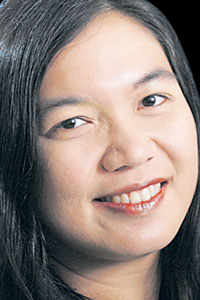Since my childhood, I have loved all kinds of animals except snakes, rats and cockroaches. I have had several dogs and a cat as pets. I was bitten once by a temple cat, once by my own cat and several times by my dogs because I accidentally frightened them. However, the weirdest experience was being bitten by a monkey on Khao Wang, or Phra Nakhon Khiri, a mountain palace museum in Phetchaburi, over a year ago. When I was a teenager, I was once surrounded by monkeys who tried to steal my handbag at Phra Kan Shrine in Lop Buri.
On Wednesday, I visited Khao Wang again. Staff at the car park near the cable car station suggested someone must wait in or around our van because monkeys often come down from the mountain to damage side mirrors of parked vehicles. As in Lop Buri, authorities urge visitors to Phra Kan Shrine to park vehicles in provided areas only since monkeys often damage cars, especially side mirrors. Similar problems also occur near Chong Krachok Mountain in Prachuap Khiri Khan.
Threats from monkeys have long persisted at numerous tourist attractions in Thailand. This year alone, several cases of monkey attacks have been reported probably due to the drought and severe water shortages. On Sept 4, many crab-eating macaques living on the mountains near Wat Tham Sua in Krabi stormed the temple ground to eat food and injured several tourists. They often steal tourists' belongings and food and damage the temple. Facebook users suggested the temple put up signs cautioning tourists on their behaviour, such as not making eye contact with monkeys, which is considered a challenge to fight.
Meanwhile, staff at Wat Tham Sua explained that the temple has a specific zone for feeding monkeys so that they are not hungry and will not attack visitors. They suggested tourists be careful with their belongings and not tease the monkeys. If visitors refuse to give them food and retaliate, monkeys will bite them immediately. In January and February, crab-eating macaques bit two Russian tourists on Koh Lan, Pattaya. The second incident happened even after Pattaya City sent staff to catch and relocate fierce male monkeys elsewhere.
In March, many monkeys living near Monkey Bay in the Noppharatthara Beach-Phi Phi Island National Park in Krabi reportedly stole food and bit several tourists. According to the chief of the national park, these monkeys have stopped searching for food naturally, but wait for tourists to feed them or steal food from tourists. The park put up signs in Thai and other languages warning tourists against feeding monkeys, but a number of tourists and tour guides have not been co-operative. In addition, Phanthai Norasing Wildlife Reserve in Samut Sakhon warned tourists against playing with monkeys to avoid being scratched or bitten and infected with rabies or meningitis. Severe drought during April and May forced crab-eating macaques living in mangroves in Bang Khun Thian, Samut Sakhon, Samut Songkhram and Phetchaburi to seek food in local communities, factories and tourist attractions. To cope with the problems, concerned parties apply different measures.
Two years ago, Lop Buri authorities started a project to allow monkeys and humans to live together happily. They required that monkeys be fed only in one provided area. This year, the province launched a population control programme of the more than 2,000 monkeys living near Phra Kan Shrine and Prang Sam Yot sanctuary, by neutering male monkeys first.
In Songkhla, concerned agencies in July started to catch, weigh, provide medical check-ups, rabies vaccines and vitamins to monkeys living on Khao Tang Kuan and Khao Noi mountains, popular tourist attractions. These fierce monkeys damage people's houses.
In Phetchaburi, authorities have sought proper measures for several years, but have yet to decide on whether to spay or relocate monkeys to other areas, said Phra Nakhon Khiri National Museum chief Prapaphan Srisook. The museum warns visitors against feeding, teasing, intimidating, challenging, making eye contact and injuring the monkeys.
From my perspective, I agree with measures to spay and avoid intimidating or feeding monkeys. Relocating monkeys to other areas is passing the buck to other people while allowing tourists to feed monkeys can cause danger to both tourists and monkeys. For example, many monkeys on Khao Sam Mook in Chon Buri were hit and killed by tourists' vehicles and a pregnant monkey fell into a coma and lost her unborn infant after an uncut boiled egg given by a tourist became stuck in her throat. Letting wild animals search for food naturally is the best way to help wildlife and humans live together happily.
Pichaya Svasti is a travel writer of the Life Section of the Bangkok Post.
